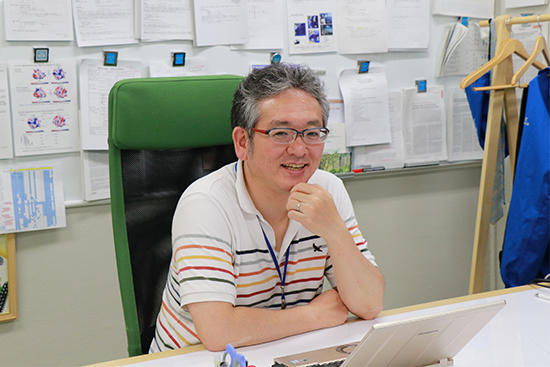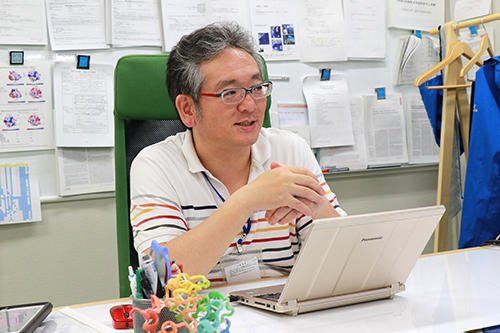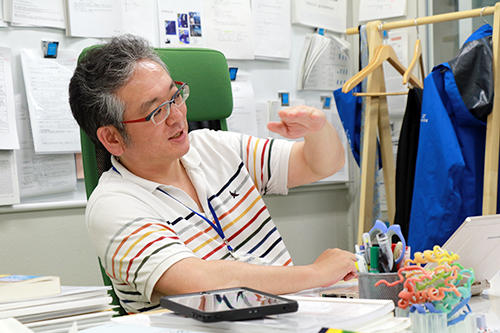April 2020
Set sail from your comfortable home port, and venture forth beyond the borders of disciplines
Today, I will be talking to Professor Ryota Iino in the Department of Life and Coordination-Complex Molecular Sciences, Institute for Molecular Science (IMS).
Prof. Iino is working to record videos of the motion of biomolecules such as proteins. Biomolecules literally "move" in our body like precision mechanical parts or tiny robots, but they are too small to be observed with ordinary optical microscopes. Prof. Iino has succeeded in capturing video of these movements by attaching scattering labels to the biomolecules. The results of his research are expected to have far reaching applications not only in the examination of how nanomachines operate, but also elucidating the mechanisms of chemical reactions.
Click here for Prof. Iino's profile.

The Road to Becoming a Researcher
First of all, please tell me why you became a researcher.
OK. When I was in university, I had more free time than I thought I would have. So, I read a variety of general science books. I found many interesting books this way. They were written by university professors, and I just thought these professors were wonderful to have written such interesting books. I wished I could become a professor and write like they had.
So, you didn't want to be a researcher in your childhood?
No, I didn't. When I was in high school, I didn't have a specific vision for the future. But I never imagined becoming an office worker. My father ran a company. I thought it was amazing. Research is a lot like the work my father did: we are like the presidents of small businesses, aren't we? We researchers have some discretion in how we use our time, and we also have the freedom to decide our policies.
Indeed. Did you encounter something academically important to you in your university?
Yes, I did. In university, I first encountered my field, biology, through the books I mentioned. I was majoring in chemistry during my master's program at the time. The books inspired me to change my major to a more biologically oriented one when I entered my doctor's program. Actually, in high school, I never had any biology classes.
Why did you choose your present subject within the field of biology?
When I was in my master's program, a technique called "single-molecule imaging" was developed and spread worldwide. In this field, the contribution of Japanese researchers has been great. At that time, I was studying chemistry. I was very impressed to see a single fluorescent molecule was really visible and was really moving in front of my eyes. You know, in chemistry we discuss molecules in terms of molarity, in numbers on the order of 1023. But now we could observe just one molecule, and this really spurred my interest in single-molecule imaging. When I entered my doctor's program, I changed my major to a field where I could perform this kind of imaging -- biophysics.
But I remember well that my supervisor at the time was against my plan. He said, "There is no such thing as biophysics. You will regret it if you go into such an unestablished field." But I had already decided. I moved to biophysics; I don't regret it at all. I am now happy to have moved at that time. Actually, my chemistry studies in my master's program have been beneficial to my current work, since biophysics is based on our understanding of molecules, which is basically chemistry.
Do you mean that your career has benefited by not focusing solely on biophysics?
Biophysics is a so-called interdisciplinary field. At that time, we had some academic societies in the field, but I think that researchers in chemistry and physics did not know what we were really doing in biophysics. However, this unconventional mixture of fields allowed something completely new, single-molecule imaging, to emerge. So, even in my present work, I think it is important to do unique, unconventional things that blur the line between fields.
Research Philosophy / Messages for Potential Researchers
Is this your research philosophy?
Yes, it is. I like to conduct joint research, working with various people. When my study is not going well, talking with people from other fields can solve problems quickly. That's why I think it's important to actively interact with people in other fields and perform interesting research. But interdisciplinary studies tend to have seemingly uneventful results, so it's important to look for interesting aspects from the perspectives of all fields involved.
Do you mean that blurring the line between disciplines tends to result in not having a clear focus?
That's right. Wide and shallow involvement is not recommended in academic research. It is important to decide the core of your study first and then spread out from there. One of the cores of my research is knowledge of optical microscopes. I totally understand the fundamentals of optical microscopes. Additionally, the core of biophysics is knowledge of molecules, or chemistry. Although "chemistry" isn't in the name, "bio-physics" relies on it. So my deep knowledge of chemistry has helped me.
So, to become a researcher, do we need to have a solid knowledge base?
Yes, right. To do that, you just have to pursue something you find interesting. If you find something that interests you, you should always chase after it. Believe in yourself, and everything will turn out fine. All the while, work on solidifying your foundation. It is not advisable to branch out into other fields before establishing a solid foundation in your field of interest.
Do you mean that someone should be trained strictly in a specific field?
I am recommending that you pursue your interest deeply rather than focusing on training. And then, expand your interest outward.
By the way, single-molecule imaging is a basic research field, but it has started to be applied in different areas. For example, you may have heard of the "$1000 genome", a technology where you can read an individual's genome for $1000. The basis of this technology is actually single-molecule imaging. Although Japan created much of the foundation for this technology, the applications were developed in Europe and the United States, quite unfortunately.
Do you mean that Japan has failed to overcome the "boundary" between basic and applied fields?
Exactly, I am afraid so. The applications in industry are very exciting now. For example, you know, we have high-precision prenatal diagnostic technology. This is also an application of single molecular detection. In this field, Japan has really not made its presence known, although again we developed the fundamentals of the technology. Therefore, it is important to always think about and look for a way to get around the boundaries with which we are presented.
Why has Japan failed at applying these technologies? Is it because of the temperament of Japanese people or the atmosphere in Japanese society?
I think those could be problems. In Japan, we respect the craftsmanship. In other words, there is a cultural difference in how Japan and the western societies view people's work. In Japan, if someone can say, "Only I can do it," the perception is very positive. On the other hand, in Europe and the US being able to say, "I made it so that anyone can use it," has an ever better perception. We need to promote application in industries by learning from aspects of western culture like automation and labor saving. We need to keep our eyes on what devices and technologies can be used in other fields. To do this, we need to recognize the limits of and demands for various technologies used in today's society.
On a positive note, recently I've heard more students say that they want to perform application-oriented research. That's a step in the right direction. But it's important not to lose sight of the fun and importance of fundamental research. I think this is one of our most important responsibilities at IMS.

Thank you for your answers. By the way, could I change gears here, because I'd like to take advantage of this important opportunity to interview you with regards to being a biophysicist?
No problem, please feel free.
Origin of Life, Consciousness, Artificial Intelligence, and Scientific Literacy
According to standard theory in biology, life began by chance. What do you think about this? Was there any special reason for the occurrence of life? I'm asking because the other day my child asked me, "Where did we come from?" but I couldn't find an appropriate answer.
Well, you are asking where study on the origin of life starts, aren't you? I am interested in lower creatures, like bacteria, more than higher life forms. Bacteria can grow and divide infinitely with proper nourishment. They almost don't appear to be creatures; they look like sophisticated machines. I'm not really interested in the "mystery of life", but more the reason why such elaborate machines were made. Insects also act like efficient robots that are simply responding to external stimuli. If you can artificially imitate these natural machines or robots, we can better understand them. This is basically my research.
Do you mean that we can understand why such great machines were made by applying our knowledge of physics and chemistry, eventually helping us to understand what life is? You mean, well, we should not be limited by the notion that a secret veil is hiding the mystery?
That's right. I'm not very interested in research on humans, although I'm often criticized for that. I'm interested in humans, actually, but I think it's very difficult to understand humans, especially to understand the human brain, for example.
It does seem particularly difficult to understand the human brain. Do you think that, for example, our "consciousness" can be understood in terms of the laws of physics and chemistry? If so, can consciousness be implemented in the form of computer software? Or otherwise, does the emergence of consciousness require the discovery of some new law of nature we have not yet discovered?
Hmm. I don't think there is some new or additional natural law necessary to understand consciousness. The neural network of the brain is very complicated, but if its connections as a logic circuit are clarified, I think that consciousness can be implemented as computer software. My thinking is basically based on "biomechanism theory."
Thank you for sharing your opinion. Could I ask another question? This might seem a bit rude, so I hope I don't offend you. For people uninterested or unfamiliar with this field, could you explain what we can get out of it?
Well, first of all, for example, artificial intelligence (AI) has had amazing advances recently. But in fact, computers running AI software require a lot calculation power. Even if an AI can beat a human opponent in Go or Shogi, it's not that surprising if we consider the energy consumed by the computer running the program. Following that line of thought, you shouldn't really think that humans are less capable than AI. Human energy consumption can be calculated from the amount of food calories (energy) you take in a day, right? We also know the amount of energy supercomputers consume. If you compare these values, you will find that humans are very energy efficient. After all, life is amazing. The molecular machines I am studying also have good energy conversion efficiency and play out their roles expending little energy.
I think that's a perspective that we can't get without a background in science. Understanding topics on AI in daily news requires the viewpoint of, well, scientific literacy and...
Exactly, this is one good example where scientific literacy really matters. With a universal method to measure energy, you can compare things that appear unrelated or disconnected. When we encounter daily news on AI, which often compares the ability AI to our own, the idea of "performance per unit of energy consumption" allows us to have more perspective on how far AI has actually advanced.
Amplitude of the "ups and downs" of life
I'm sorry to change the subject again. I remember that you liked reading books. Could I ask about your current hobbies?
I like reading even now, but recently I've been so busy that I can't make time to read. So, my recent hobby has mostly been watching my child grow up. Children change biologically, socially and, of course, intellectually. Recently, even if I try my best at card games, I cannot beat my child. I never get bored watching them grow. My child is very special to me, as both a researcher and a human.
My children are special to me, too. But, dare I say it, children are quite a burden, aren't they?
I agree, actually. I am sure that I have experienced both happy and difficult times with my child. But I, and you may as well, feel like I am being swung around by my children at times. This increases the ups and downs of, or to put it another way, the "amplitude of the wave" of your life. But, I think this stimulus is a good thing. Because of my child, the wave of my life is no longer flat. Life is boring without such big waves, although that might be a saying I'm stealing from someone else.
Certainly, I have that same feeling. Then, is this fluctuation in the "amplitude of life's wave" important in research?
It is important, and I think the larger the wave the better. Young students are afraid of failure. Once they fail, they tend to think they've totally lost. There is no such thing. In research, we fail most of the time. The more you work, the bigger your amplitude will become. The important point is how high the wave can take you, although you may get wiped by the sea afterwards. Always try. It is important to always challenge yourself and not be satisfied with the status quo.

I would like to ask about your "wave." You have worked for a number of universities, and after that came to the Institute for Molecular Science (IMS). I think you have experienced a variety of research environments. What are the differences in research environments between those universities and IMS?
First, one advantage is there is remarkably little work other than research. For concentrating on research, IMS is wonderful. There are many important jobs other than research in universities, such as lectures and entrance examinations. Although we have responsibilities to SOKENDAI (The Graduate University for Advanced Studies) and related jobs here, we have a lot of time available for research. On the other hand, the disadvantage of IMS is, I dare say, that the number of students admitted to IMS is small, so there is little change in the people around you. Because of this, the "amplitude" around here tends to be small. Although a high flow of students in or out may cause some difficulties, we do not have the opportunities collaborating with many students can provide. Our research group consists of a fixed set of members for a long time, and all the members become older together. That's not good. In order to improve that, it is important to circulate human resources. It is one of the missions of IMS.
At IMS, we put so much effort into the circulation of human resources. Is this not because the people at IMS tend to move, but rather because they tend to be less likely to move?
That's right. That's an important, meaningful effort that we make. I want my lab to have more students if possible. But it's difficult and there's never enough. The most important thing to think about in running of my lab is how to give my members movement momentum and to create an atmosphere in which they don't feel stagnated in their work.
So, are you feeling stagnated lately?
A bit, yes. I'm feeling like there's a bit of a problem. I think that IMS is a good environment. However, if you stay in one place for too long just because it's comfortable for you, you might eventually be unhappy. This can happen anywhere, not just IMS. No matter how comfortable you are in your "comfort zone," you need to make an effort to get out of it. I'm enjoying research at IMS, but I have to leave someday. It is important not to be afraid of change, but rather to seek it.
Thank you very much.
Translated by Hideki Katayanagi
Photo by Miyuki Harada
Translated from Original (Japanese) Written by Hideki Katayanagi
Photo by Miyuki Harada
December 2019 |




